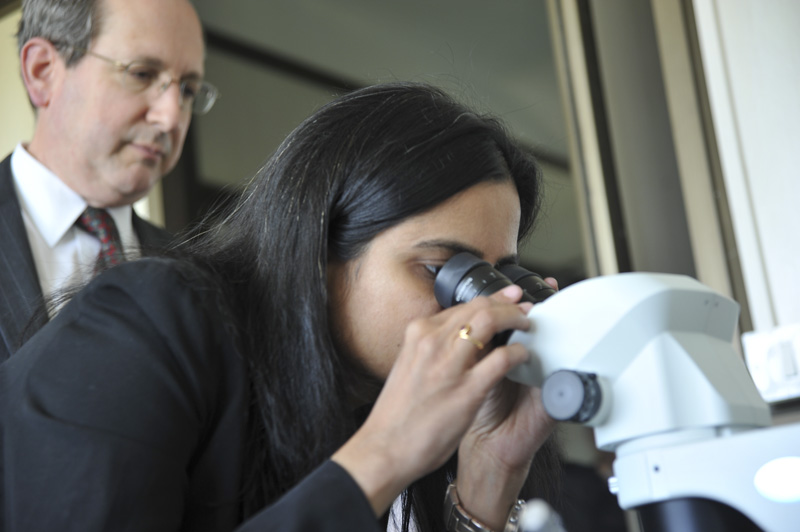Lawrence's India trip advances partnership
Faculty and administrators of Brandeis University and India’s National Center for Biological Sciences (NCBS) have agreed to work toward creating a formal institutional partnership that could involve graduate students, undergraduates and post-docs.
A consensus to form small working groups and hold planning sessions was reached at a meeting on the NCBS campus in Bangalore this week during which representatives of the two schools enthusiastically explored some possible starting points. The first planning meeting could take place this coming summer, when several Brandeis professors will be working at NCBS, and be followed by a session at Brandeis next year.
|
President Lawrence is blogging during his India trip. Check out his latest posts. |
Brandeis was represented at the meeting by President Fred Lawrence, who has a stated goal of expanding and deepening the university’s international engagements, Vice President for Global Affairs Daniel Terris and Bulbul Chakraborty, the Enid and Nate Ancell Professor of Physics.
Groundwork for the meeting was laid by Division of Science Chair Eve Marder, the Victor and Gwendolyn Beinfield Professor of Neuroscience and a longtime member of the NCBS science advisory board. Marder was on the NCBS campus in January to deliver a lecture.
Brandeis and NCBS have long had numerous faculty-to-faculty and personal relationships. Three labs at NCBS now are headed by researchers who did their graduate or post graduate work at Brandeis. A daughter of Dr. Obaid Siddiqi, the founder of NCBS, graduated Brandeis in 1986.
Possible collaborations mentioned at the meeting this week included exchanges of graduate students in labs where Brandeis and science center faculty already have one-on-one relationships, creation of a Justice Brandeis semester during which undergraduates would work and study in the center’s wildlife conservation program, and the creation of post-doctoral fellowships that would involve work at both institutions.
During a tour of the center prior to the meeting on collaborations, the Brandeis delegation met Vatsala Thirumalai, who worked on her Ph.D. in Marder’s lab and was influenced by Marder to return to India to work at NCBS. Thirumalai now heads a lab researching nervous system development.
“It’s all about fit,” Thirumalai said, referring both to her own decision to work in India and to possibilities for scientists to move back and forth between Brandeis and NCBS. “What are your family concerns? Where do you fit as a researcher? Eve is really very perceptive.”
Thirumalai studies electrical activity in zebra fish embryos to advance knowledge on how nervous systems form. The main impetus for faculty collaborations between schools is the stimulation created by exchanges of ideas.
“Nobody at NCBS works on lobsters” – on which Marder has done much work – “but when Eve comes everybody gets excited,” Thirumalai said. “It energizes me and my students. It gives me ideas.”
There is currently a fit between US and Indian research organizations, according to scientists in both countries in that there are many highly qualified researchers in America but a relative shortage of funding and a lot of funding in India but a relative shortage of high-level researchers.
Subramanian Ramaswamy, who is dean of the Institute for Stem Cell Biology and Regenerative Medicine, which is closely associated with NCBS, returned to India to work in January after 10 years at the University of Iowa.
“I came back for the chance to do something dramatically new,” he said during a break in the talks. “In the US right now, you can keep doing what you’ve been doing, but given the current economic situation it is hard to do something new.”
Satyajiy Mayor, who is dean of NCBS and led scientists and administrators from the center in their talks with the Brandeis group, outlined principal areas of activity at NCBS and said that “we have difficulty with critical mass” because of desire for rapid expansion of research here. “We are very keen to have people visiting us in all these areas for short- and long-term work.”
He is particularly interested in arranging such visits through Brandeis, he said, because “we have a long history with people at Brandeis. This is a strong and deep association.”
President Lawrence told the NCBS representatives that institutionalizing connections with their center makes sense because Brandeis is “looking for sustained deep engagement in a select number of countries” – of which Israel and India are currently foremost – and because Brandeis and NCBS are both relatively small and share great interest in neuroscience.
Categories: International Affairs, Research, Science and Technology






